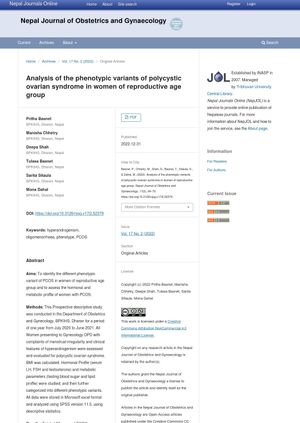Analysis of the Phenotypic Variants of Polycystic Ovarian Syndrome in Women of Reproductive Age Group
December 2022
in “
Nepal Journal of Obstetrics and Gynaecology
”

TLDR The most common form of PCOS in the group was anovulatory PCOS, with no cases of obese PCOS, highlighting the importance of assessing lean women with menstrual issues.
The study "Analysis of the phenotypic variants of polycystic ovarian syndrome in women of reproductive age group" conducted by Pritha Basnet et al. over a year from July 2020 to June 2021, involved 80 women presenting with menstrual irregularity and clinical features of hyperandrogenism. The most common phenotypic variant of Polycystic Ovarian Syndrome (PCOS) found was Type B (60% of cases), followed by Type D (30% of cases). The mean Body Mass Index (BMI) of the participants was 22.4± 4.2kg/m2. The study concluded that anovulatory PCOS was the most common variant in the study population and no obese PCOS cases were found, emphasizing the need for evaluation in lean women with or without hyperandrogenism presenting with menstrual irregularities.




